
Image by Vancouver Film School available at Flickr.com under CC license.
As China has pursued greater influence over public opinion globally, responding to Xi Jinping’s call to “tell China’s stories well,” foreign media have been crucial channels for the state to reach audiences overseas. In some cases, state media have borrowed exposure through drop-in content, paying for the direct insert of state propaganda. But another important and perhaps more effective tactic has been the covert or non-transparent placement of state-produced messages through content sharing and co-production deals. These deals expose foreign audiences to programming from the Chinese state — often without the knowledge of even overseas media partners.
One of China’s most potent actors in this arena has been the China International Communication Center (五洲传播中心), or CICC, also known in Chinese as the China International Press (五洲传播出版社), and China Intercontinental Press Media (五洲传播出版传媒), or CIPM. CICC is housed directly under the Information Office of China’s State Council, whose main task is to produce foreign propaganda. The Information Office is essentially twinned with the Party’s Central Propaganda Department (CPD), a phenomenon known in Chinese as “one office, two signs on the door.” CICC’s physical offices are at the CPD office in central Beijing.
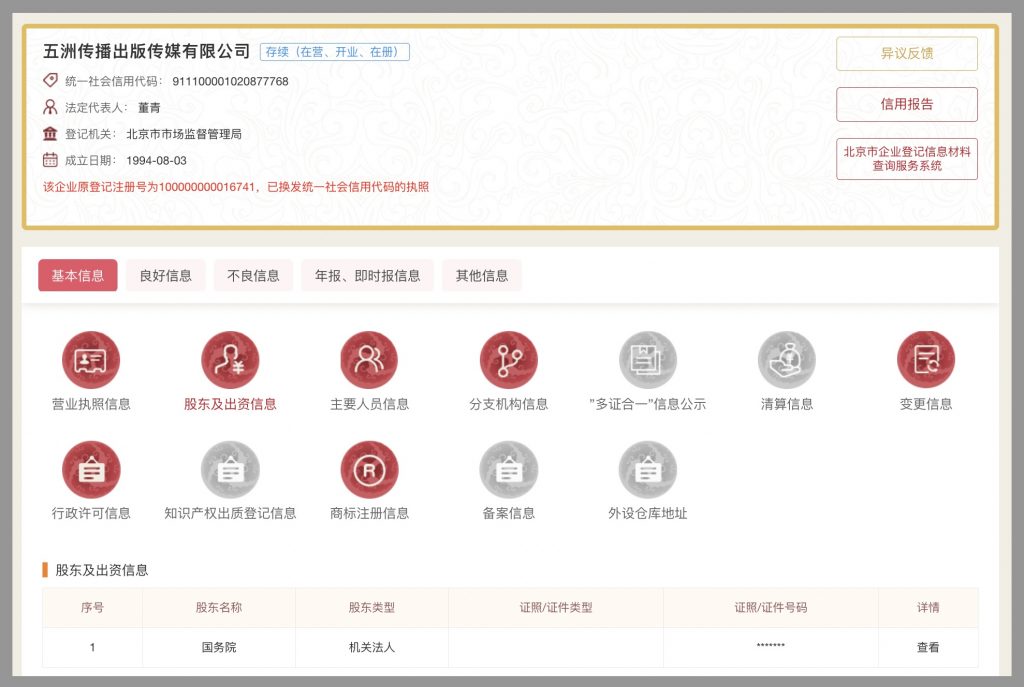
Dong Qing (董青), the current CEO of CICC, is a veteran official within the Central Propaganda Department, having previously served as chief editor of China Culture Online, a website jointly operated by the Central Propaganda Department and its Central Civilization Office, otherwise known as the Central Steering Committee for Spiritual Civilization Construction. Go back 10 years and Dong served as the deputy chief of the First Bureau of the Central Civilization Office, whose top official is typically a deputy minister of the CPD.
But despite its clear and direct association with the Central Propaganda Department, CICC has presented itself globally as a media group ready to do business, providing foreign outlets with film and documentary content about China, and offering access to China’s vast film and television market.
Silk Road Stories in Southeast Asia
One of the many foreign media to cooperate with CICC is the Malaysian Chinese-language channel 8 TV, whose parent company, Media Prima Berhad, signed a strategic cooperation agreement in 2017 for the broadcasting of a series of documentaries under the label “Silk Road Time” (丝路时间), also known as “USilk.” While the documentaries ostensibly offered Malaysian viewers an opportunity to better understand Chinese culture, the products on offer, produced entirely by CICC, fully accommodated China’s larger foreign policy and trade goals, seeking to build support and sympathy for Xi Jinping’s signature “Belt and Road” initiative.
Despite its clear and direct association with the Central Propaganda Department, CICC has presented itself globally as a media group ready to do business.
The partnership began with a pilot broadcast of nine episodes of “USilk” supported by CICC during the first year, but both sides spoke of longer-term cooperation. “The partnership will not be time-limited, and building on the launch of the documentary series on the Silk Road, the two sides can develop further cooperation in the future,” Media Prima Berhad CEO Dato’ Kamakali said at the time.
Founded in 2003, Media Prima Berhad (首要媒体有限公司) is a privately-owned company with a portfolio spanning television, newspaper, radio, outdoor advertising, and online media. It claims to be Malaysia’s largest integrated media company.
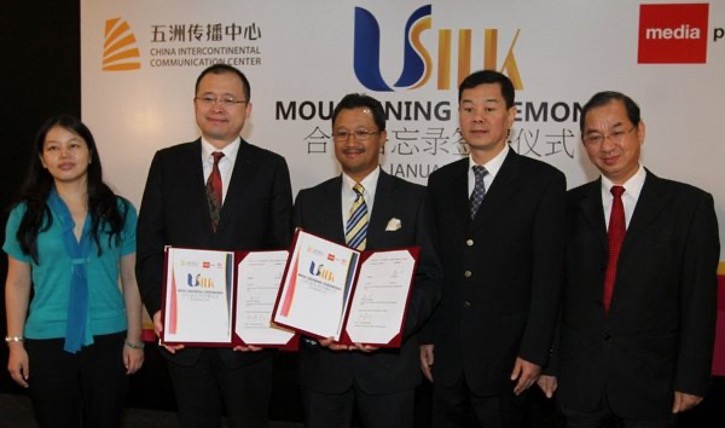
Attending the signing ceremony in Malaysia in 2017 was Jing Shuiqing (井水清), named in local media reports as the deputy director of CICC’s Center for Media Promotion. Often identified publicly outside of China as the vice-president or editor-in-chief of CICC, Jing has made regular appearances at bona fide international film and television production events and festivals, like Asian Side of the Doc (where he hosted an event on “USilk” in 2020), or France’s Sunny Side of the Doc marketplace. In 2019, he was in Qatar to sign a cooperation agreement, again under the “USilk” label, with Al Jazeera.
But make no mistake: Though Jing may wear a hat overseas as a film and television executive, his executive position at the propaganda department-affiliated CICC places him among China’s most senior propaganda officials. He is also the legal representative of its private commercial subsidiary, China Intercontinental Co., Ltd (五洲传播有限公司).
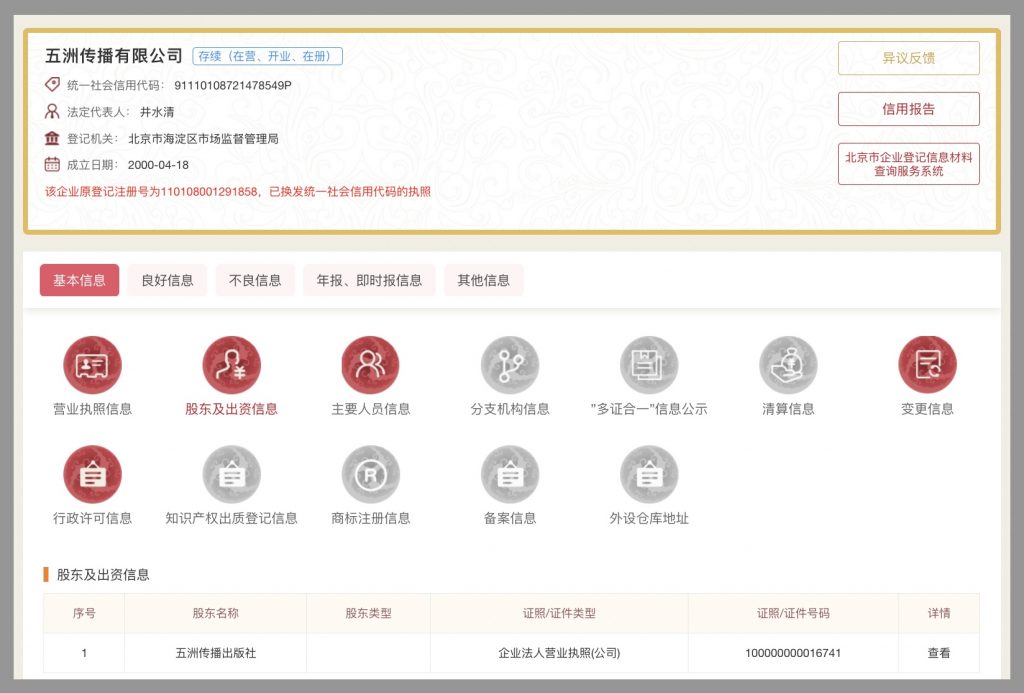
During the signing ceremony in 2017, Jing directly referenced the “Belt and Road” initiative, saying that he hoped cooperation with media like 8 TV would mean that “more and more stories of the Silk Road will be brought to the world.”
8 TV is reportedly the first company in Malaysia to cooperate with CICC, though CICC has cooperated with other media groups in the region, including Singapore-based Discovery Networks Asia-Pacific since 2015. Just last year, the group announced it was cooperating with National Television of Cambodia (柬埔寨国家电视台) to co-produce a 30-minute documentary called Sino-Cambodian Feeling Through Thick and Thin (患难与共中柬情), which emphasized China’s aid to Cambodia during the global pandemic. The deal was proudly promoted through the official website of the Chinese Embassy in Cambodia, which noted that the process had been led by the Overseas Promotion Office of the Central Propaganda Department.
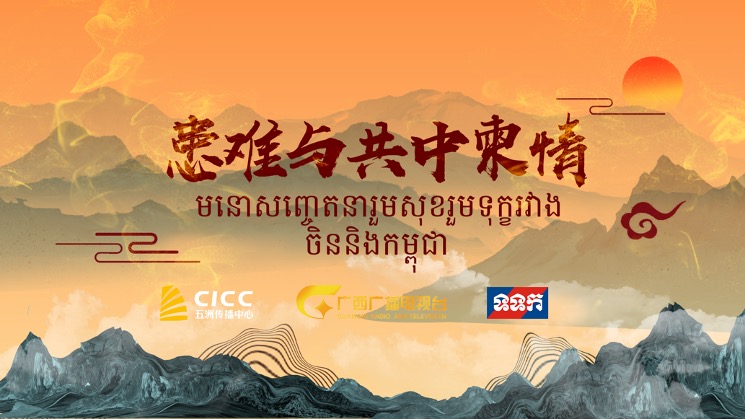
Propaganda Goes Private
China’s quasi-privatization of its domestic propaganda and media control structures, along with close links between government and commercial actors (such as Tencent and iQiyi), has enabled it to muddy the waters when it comes to international cooperation and co-production. In many cases, foreign partners have little notion when dealing with partners like CICC that they have effectively contracted with the CCP and government agencies, and that they have opened their channels and audiences to the external messaging of the Chinese state.
The “USilk” series has been rolled out through broadcasters in countries across the world. Most recently, its documentaries have been played on Bulgarian National Television (BNT), the country’s national public service broadcaster, and on Macau’s TDM. In 2021, CICC announced that it had “cooperated in the building of the ‘USilk’ television program [series]” with Kordia, a broadcaster owned by the New Zealand government. Typical of China’s broad understanding of the notion of “cooperation,” this meant only that CICC had managed to license its content to Kordia.
China’s quasi-privatization of its domestic propaganda and media control structures has enabled it to muddy the waters when it comes to international cooperation and co-production.
That content included individual programs like Return to the Red Flag Canal (重返红旗渠), a sentimental documentary in which French film producer Jérôme Clément, the founder and former CEO of the European public service channel Arte, is led on an official tour of Henan’s Red Flag Canal. As Clément visits the site, “impressed by the visible changes in China,” he and the documentary’s viewers are treated to a sanitized story of heroism and sacrifice, recounting the construction of the canal between 1960 and 1969, an episode that has become integral to the CCP’s construction of its history as a series of legendary feats.
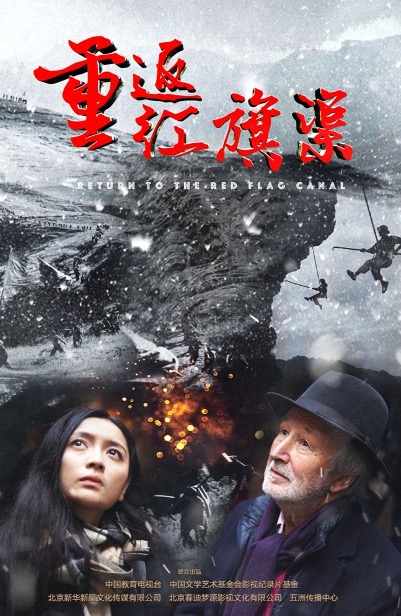
Long fallen into disrepair, the Red Flag Canal has today become a “red tourism” attraction, held up as “a patriotic model of the Communist spirit” under Mao Zedong Thought. But Clément’s present-day tour, woven in awkwardly with a manufactured narrative strand about the artistic journey of young female pianist Wang Chen (“You have to know yourself very well and listen to your inner voice,” the former Arte CEO at one point advises her), is meant to shoeshine the Red Flag Canal myth — and the message that for China, which strives tirelessly under CCP leadership, nothing is impossible.
In some cases, CICC productions intersect even more blatantly with the international propaganda objectives of the CCP. In December 2020, two full years before the chaotic and long overdue ending of China’s “zero Covid” policy, CICC was behind the production of the documentary Covid-19: Battling the Devil (新冠肺炎: 与魔鬼的战斗), a ringing endorsement of the government’s handling of the epidemic outbreak in Wuhan. The production, a cooperation with the private Chinese video platform Bilibili, was distributed outside China by the Discovery Channel, enabling it to reach a massive global audience. According to CICC, the documentary was aired in more than 200 countries.

In other cases, the messaging is far more subtle, aimed at showcasing Chinese traditional culture and modernity while emphasizing cooperation and friendship. In China: Mission Sojourney (跟我走吧朋友), a reality show produced by CICC and the film and television division of Sina, the Nasdaq-listed Chinese internet company, a group of domestic and international personalities are brought together to explore Chinese culture and create collaboratively. They include Chilean-born American interior designer Juan Pablo Molyneux, Chinese pop idol Xiao Rainco (肖宇梁), and French contemporary dancer Cindy Villemin. “I want to express the Chinese culture through Western eyes,” Molyneux says at one point.
State media have claimed that the series reached an audience of 600 million people in more than 40 countries around the world after premiering on the South Korean nationwide pay television network TVN.
A Media Group with a Foreign Policy Role?
Beyond CICC’s individual agreements with media groups across the world, the group’s multifaceted and ambiguous role can be seen plainly in its initiation of the so-called “Belt and Road” Media Cooperation Union (“一带一路”媒体传播联盟), an ostensibly non-government partnership of media organizations that directly serves China’s foreign policy and communication goals.
It is a common tactic of the Chinese government and association institutions to invite foreign participants to professional and business forums, and then to lend these forums an official and summit-like air, even admitting guests — who might suppose they are simply in town for a conference or networking opportunity — as “members” in a formal alliance of supposed common interests. Another prime example of this is the “Belt and Road” News Network (“一带一路”新闻合作联盟), or BRNN, led by the CCP’s official People’s Daily, with its website hosted on the newspaper’s servers.
Formed in April 2016, the CICC’s “Belt and Road” Media Cooperation Union claims to bring together more than 150 media from 43 countries and regions to promote what CICC calls “diversified media cooperation programs.” From the beginning, the MCU’s support from the State Council Information Office was openly acknowledged, and officials made clear that the group was an extension of Xi Jinping’s signature foreign policy initiative. The opening address at the MCU’s formation was delivered by Cui Yuying (崔玉英), a deputy director of the Central Propaganda Department and deputy chief of the State Council Information Office.
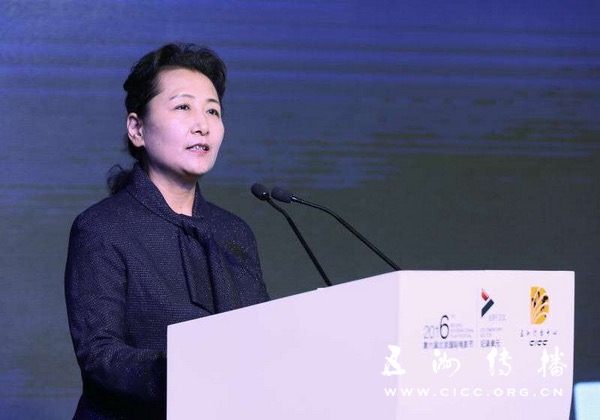
17 partner media agencies reportedly “signed” the MCU in 2016, including the Discovery Channel, the National Geographic Channel, and the History Channel (all three channels under Discovery Networks Asia-Pacific, whose collaboration with CICC reaches back to 2004). Singapore’s Channel NewsAsia, or CNA, the multi-language news outlet under the national public broadcaster MediaCorp, also signed on.
CICC launched its “USilk” program at the same 2016 meeting under the auspices of the newly-formed MCU, meaning that the media group could effectively leverage a government-backed global forum to push commercial interests overlapping with the external propaganda objectives of the state. By 2018, the MCU claimed 60 members and reported that mainstream media from more than 20 countries were already running “USilk” content in 14 languages. Aside from Malaysia’s 8 TV, partners in Southeast Asia included National Broadcasting Services of Thailand (NBT), the broadcasting arm of Thailand’s government.
Co-Production as Usual
CICC has continued to strike up partnerships with media in every region of the world, effectively distributing factual and entertainment content to global audiences, all the while presenting itself as just another professional partner for co-productions.
Last year, the BBC released a six-part series called China on Stage, produced by CICC, Bilibili and the UK production company Lion TV. One episode of that series artfully played up the Shanghai premiere of the original Chinese musical “On the Road,” which lionizes the hard work and selflessness of China’s delivery riders during the pandemic. The host of the episode at one point calls the musical “a tribute to the long hours, hard work, and dedication of delivery couriers.” But the musical is also an official production by a state-run arts group, expressly intended to “sing the main melody” (唱出主旋律), a reference to media and cultural activity in China that sticks to the main political line of the CCP.
While one could certainly argue that the China on Stage treatment of “On the Road” does not broadly impact views of China in the UK, it makes for an awkward contrast with professional news coverage of the plight facing many gig workers in China, including the BBC’s own coverage of the extreme and unnecessary difficulties facing delivery riders.
It also offers a glimpse of the ingenious ways China now manages to use coverage of arts and culture to convey more subtle political messages. The fostering of such ingenuity is part of the formation story of CICC. Before its transformation into the commercial enterprise CICC in 2011, China Intercontinental largely produced material “with a strong propaganda tone” that was, according to documentary filmmaker Ming Yu, “incapable of communicating China’s image to the world, nor of influencing the world.”
CICC’s commercialization and internationalization enabled it to capitalize not just on foreign distribution channels, but also on foreign production know-how that took better account of overseas audiences. As global interest in China grew dramatically from the late 2000s onward, CICC was also in a unique position to foster international co-productions, as it was “responsible for not only promoting Chinese culture globally but also supervising and issuing filming permission to international broadcasters and media companies.”
More than a decade later, the results of that change can be seen in the polished, glittering mediocrity of many CICC productions.
Take for example the six-episode series Journey of Warriors (勇敢者的征程), produced by CICC along with Tencent Video and Discovery. It follows five celebrities as they attempt arduous treks – à la Naked and Afraid – along routes traversed by the Red Army during the Long March in 1934-1935 and during China’s struggle against the invading Japanese army. CICC and Chinese state media quite nakedly promoted the series as a celebration of the Party’s centennial, but millions of viewers in Discovery markets across the world were none the wiser. The Central Propaganda Department’s direct role in the production was never mentioned by the American company [See CMP’s “Warriors on the Red Road”].
CICC’s commercialization and internationalization enabled it to capitalize not just on foreign distribution channels, but also on foreign production know-how that took better account of overseas audiences.
Whatever commercial partners like Discovery, CNA, and the BBC might imagine they are engaged in, the CICC and its “Belt and Road” Media Cooperation Union are fronts for the Chinese Party-state and its communication goals — from the control of access to the “China story,” to the determined export of sanitized stories that suit and serve the “main melody.”
Nevertheless, co-production continues as usual. By maintaining the pretense that CICC is just another commercial production enterprise with its finger on the pulse of the Chinese market, China’s global media partners are complicit in supporting the messages and values of the Party-state — including the robust controls on information that arise from the conviction that the CCP must have a monopoly on the “China story.”
When the American mass media holding company Gannett announced its partnership with CICC in June last year for a series of documentaries called “Sister City,” to be released by USA TODAY Studios, it referred to the Chinese group as simply “an international communication company” dedicated to “high-quality factual programs.” Similarly, as her company inked a co-production deal with CICC and Insight TV for a factual adventure series on the Great Wall, Bomanbridge Media CEO Sonia Fleck praised CICC as “such an innovative leader and dependable partner for top factual content in the premium China market.”
The image may seem to fit when factual programming deals with the wonders of ancient history, the rhythms of nature, or the most adorable and enduring of foreign policy distractions: the giant panda. But it is a huge disservice to global television audiences who deserve the facts about how the cultural products they consume are made, whether about pandas or pandemics.




















